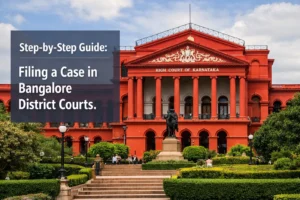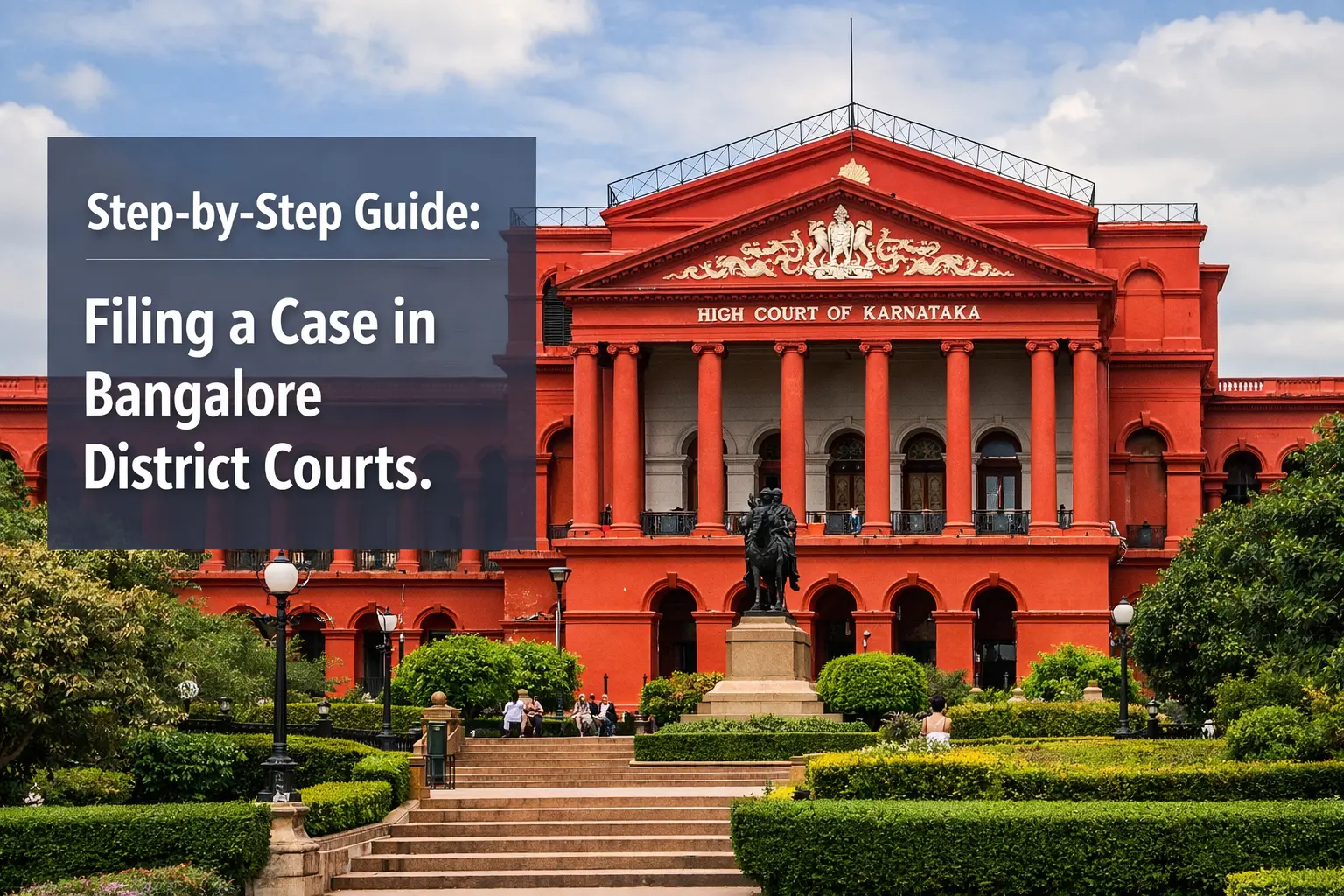
In the bustling tech hub of Bangalore, innovation thrives and data flows freely. Yet, businesses here face an invisible but potent threat: data privacy breaches and their complex legal aftermath.
Imagine waking up to news that your company’s customer data has been compromised. This isn’t just a financial nightmare; it’s a significant blow to your hard-earned reputation. Such scenarios are far from hypothetical. The IBM Cost of a Data Breach Report 2024 revealed that the average cost of a data breach in India hit a record high of ₹19.5 crore. This marks a staggering 39% increase since 2020. Additionally, CERT-In reported 1.59 million cybersecurity incidents in India in 2023.
For Small & Medium Businesses (SMBs) in Bangalore, startups, and even established corporate legal teams, understanding data privacy laws Bangalore is no longer optional. It’s a strategic imperative. Non-compliance with evolving regulations can lead to colossal penalties, damaging lawsuits, and irreversible reputational harm. As seasoned legal experts specializing in cybersecurity legal consulting Bangalore, Advocates in Bangalore helps businesses navigate this complex landscape.
This comprehensive guide will delve into the critical aspects of data privacy and data breach legalities specifically for businesses operating in Bangalore. We’ll cover the revolutionary DPDP Act, practical compliance steps, and essential data breach crisis management strategies. Our goal is to outline how you can protect your digital assets and reputation, ensuring your business thrives in a secure and compliant environment.
Understanding the Foundation: What Are Data Privacy Laws Bangalore Businesses Must Know?
Data privacy is more than just a buzzword; it’s about safeguarding the personal information of your customers, employees, and partners. For businesses in Bangalore, a city at the forefront of India’s digital transformation, this understanding is paramount. From IT companies to manufacturing and service providers, nearly every business here handles sensitive digital data daily, increasing the urgency for robust data protection.
Defining Data Privacy & Why Bangalore Businesses Should Care
Data privacy, at its core, refers to the right of individuals to control their personal information. For your Bangalore business, this means responsibly collecting, storing, processing, and sharing Personally Identifiable Information (PII). This includes data like names, addresses, financial details, and even biometric information.
The Bangalore context makes data privacy especially critical due to:
- High Digital Adoption: Bangalore’s workforce and consumer base are highly digitally engaged. This leads to vast amounts of personal data being processed.
- Diverse Industries: From booming IT startups in HSR Layout to traditional manufacturing units in Peenya, every sector is increasingly data-driven.
- Increased Regulatory Scrutiny: With new laws, regulatory bodies are more vigilant about compliance.
Here are the core principles guiding data privacy that every Bangalore business should adhere to:
- Lawfulness, Fairness, and Transparency: Process data only for legitimate reasons, fairly, and with clear communication to individuals.
- Purpose Limitation: Collect data only for specified, explicit, and lawful purposes.
- Data Minimisation: Collect only the personal data absolutely necessary for the stated purpose.
- Accuracy: Ensure data is accurate and kept up to date.
- Storage Limitation: Retain data only as long as necessary for the purpose.
- Integrity & Confidentiality: Protect data from unauthorized access, accidental loss, or damage.
It’s not just about your customers. Your employees also have significant data privacy rights under the emerging data privacy laws Bangalore landscape. These include the right to consent, access their data, and request corrections. Handling employee data with care is crucial to avoid internal legal disputes and maintain trust.

Read Also: Cyberbulling Laws in Bangalore
Key Legislations Governing Bangalore Businesses
While the global data privacy landscape includes GDPR, for businesses operating in Bangalore, the focus is squarely on Indian regulations.
The Digital Personal Data Protection Act, 2023 (DPDP Act): The Game-Changer
This is India’s landmark legislation for digital personal data. It marks a significant shift, introducing comprehensive obligations for data fiduciaries (entities determining purpose and means of data processing) and empowering data principals (individuals whose data is processed).
- Applicability: Applies to processing of digital personal data within India. It also covers processing outside India if it relates to offering goods/services to individuals in India.
- Consent Requirements: Emphasizes free, specific, informed, unconditional, and unambiguous consent with a clear affirmative action.
- Data Principal Rights: Grants individuals rights such as access to information, correction, erasure, and grievance redressal.
- Data Fiduciary Obligations: Mandates data security safeguards, data breach notification, and certain data retention limits.
Information Technology Act, 2000 (IT Act): Still Relevant!
While the DPDP Act is newer, the IT Act, 2000, and its associated rules remain pertinent, especially for cybersecurity aspects and liability.
- Section 43A: Holds a body corporate liable for compensation if negligence in implementing reasonable security practices and procedures leads to a wrongful loss or gain of sensitive personal data or information.
- Section 72: Addresses breach of confidentiality and privacy by persons who have gained access to electronic records under a contract.
Depending on your industry in Bangalore, additional rules might apply. For instance, the Reserve Bank of India (RBI) has stringent guidelines for financial institutions on data storage and security, directly impacting FinTech startups in Bangalore. Similarly, healthcare entities handling sensitive health data have specific compliance requirements.
Navigating DPDP Act Compliance in Bangalore: A Step-by-Step Guide
The DPDP Act demands proactive measures. For businesses in Bangalore, understanding and implementing these steps is not just about avoiding penalties; it’s about building trust and ensuring business continuity.
Is Your Bangalore Business Covered? DPDP Applicability Explained
A common question among SMEs in Bangalore is, “Is DPDP Act 2023 applicable to small businesses?” The answer is overwhelmingly yes. The Act’s applicability is broad and generally covers any entity processing digital personal data within India, or offering goods/services to individuals in India. There are no specific turnover or employee count thresholds that explicitly exempt small businesses from its purview.
Consider these points:
- Are you processing digital personal data of individuals (customers, employees, vendors) located within India?
- Are you offering goods or services to individuals in India, even if your main operations are abroad?
- Are you profiling individuals in India (e.g., for targeted advertising)?
Statistic: “According to a recent industry report, over 70% of Bangalore SMEs process customer data digitally, bringing them under DPDP scope. This highlights the urgent need for data privacy laws for SMEs Bangalore.”

Read Also: Cyber Fraud Cases Bangalore
Essential DPDP Compliance Steps for Bangalore Companies
Achieving DPDP Act compliance Bangalore requires a structured approach. Here are practical, actionable steps tailored for businesses in the city:
- Data Audit & Mapping: Identify exactly what personal data your business collects, where it’s stored, how it’s processed, and who has access. This foundational step reveals your data landscape.
- Privacy Notice (Policy): Draft a clear, concise, and accessible privacy policy that meets DPDP Act requirements. It must inform data principals about data collection, purpose, their rights, and how to exercise them.
- Consent Mechanisms: Implement robust, verifiable consent processes. This means obtaining explicit consent before collecting and processing data, especially for marketing or sharing with third parties. Ensure easy withdrawal of consent.
- Data Security Safeguards: Implement reasonable technical and organizational measures to protect personal data. This includes access controls, encryption, pseudonymization, and regular security audits.
- Appointing Key Roles: Assess if your business qualifies as a “Significant Data Fiduciary” requiring a Data Protection Officer (DPO). Even if not, designate a clear point of contact for data privacy grievances.
- Data Retention Policies: Establish and enforce clear policies for how long you retain data. Ensure data is deleted once the purpose is served or consent is withdrawn, unless legally required otherwise.
- Data Breach Response Plan: Develop a documented incident response plan outlining steps to take in case of a data breach. This includes containment, assessment, and reporting.
Understanding Penalties: The Cost of Non-Compliance in Bangalore
The consequences of failing to comply with data privacy laws Bangalore are severe and designed to act as a strong deterrent.
- DPDP Act Penalties: The DPDP Act introduces substantial financial penalties. For instance, failing to implement reasonable security safeguards to prevent a data breach can incur a penalty of up to ₹250 Crore. Failure to notify the Data Protection Board or affected individuals about a data breach can lead to fines of up to ₹200 Crore. Penalties are per instance, meaning multiple violations can accumulate rapidly.
- IT Act Section 43A Liabilities: Even with DPDP, the IT Act’s Section 43A remains relevant. Under this section, a body corporate can be liable to pay compensation to affected persons for negligence in implementing reasonable security practices that lead to wrongful loss.
- Reputational Damage: Beyond monetary fines, a data breach can catastrophically damage your business’s reputation. This leads to customer churn, loss of trust, and difficulty attracting new clients. This can often be more costly than the fines themselves.
Statistic: “Projected fines under DPDP for Indian businesses could exceed ₹500 Crore INR in 2025 alone, based on initial projections and the volume of digital transactions in India’s tech hubs like Bangalore.”

Read Also: Cyber Crime Lawyer in Bangalore
Data Breach Crisis Management: Legal Obligations & Actions in Bangalore
A data breach isn’t a matter of “if,” but “when.” Having a robust crisis management plan, supported by legal expertise, is paramount for any business in Bangalore.
Immediate Steps After Discovering a Data Breach
The critical first 48-72 hours after discovering a data breach are crucial. Your immediate actions can significantly impact legal liability and recovery.
- Activate Incident Response Team: Assemble a dedicated team comprising IT, legal, PR, and management.
- Contain the Breach: Immediately isolate affected systems, take them offline, or implement other measures to stop further data loss.
- Assess the Damage: Determine the scope of the breach, what data was compromised, and how many individuals are affected.
- Preserve Evidence: Crucially, secure all logs, system images, communication records, and any other digital evidence. This is vital for forensic analysis and potential legal proceedings.
- Engage Legal Counsel Immediately: Contact cybersecurity legal consulting Bangalore experts like Advocates in Bangalore. Early legal involvement ensures all actions comply with law and protect your business’s interests.
Mandatory Breach Reporting under DPDP & IT Act
Ignoring a data breach is not an option. Both the DPDP Act and the IT Act impose reporting obligations.
- DPDP Act Requirements:
- 72-Hour Notification: If a personal data breach occurs, Data Fiduciaries must notify the Data Protection Board of India (DPB) within 72 hours of becoming aware of the breach, along with a detailed report.
- Affected Individual Notification: You must also notify affected Data Principals (individuals) if the breach is likely to cause significant harm to them.
- IT Act Section 43A Implications: While less specific on timelines than DPDP, the IT Act can still hold you accountable if your negligence led to the breach.
- CERT-In Reporting: Depending on the severity and type of breach (e.g., cyberattacks, critical infrastructure), reporting to the Indian Computer Emergency Response Team (CERT-In) might also be mandatory.
Local Angle: For Bangalore-based companies, understanding the process for reporting to central authorities while ensuring local compliance with legal counsel is key.
Legal Recourse & Litigation After a Breach
A data breach can quickly escalate into a legal battle. Advocates in Bangalore can assist with:
- Representing Affected Individuals: While your focus is your business, individuals impacted by a breach might seek legal recourse.
- Defending Businesses: Protecting your company against regulatory actions by the DPB, CERT-In, and potential civil lawsuits from affected parties. This can involve defending against claims under the IT Act and DPDP Act.
- Pursuing Claims: If the breach was due to a negligent vendor or internal misconduct, pursuing claims against third parties or enforcing employee data theft laws in Bangalore companies.
- Court Proceedings: Navigating litigation, including potential cases in the Karnataka High Court or other relevant tribunals.
Securing Your Business with Expert Legal Counsel in Bangalore
In the complex world of data privacy laws Bangalore and the ever-present threat of data breaches, generic legal advice simply won’t cut it. Your business needs specialized expertise.
Why Choose Specialized Data Privacy Lawyers?
The nuances of data privacy laws for businesses in Bangalore require more than just general corporate legal knowledge. Specialized lawyers possess:
- Deep Understanding of Evolving Tech Laws: They stay abreast of the latest amendments to the DPDP Act, IT Act, and emerging regulations.
- Regulatory Body Expertise: Familiarity with the Data Protection Board of India (DPB) and CERT-In’s procedures.
- Technical Acumen: Ability to understand the technical aspects of data processing, security measures, and breach forensics.
- Proactive vs. Reactive: They not only assist in breach response but also help implement proactive compliance programs, significantly reducing your risk.
Services Offered by Advocates in Bangalore: Your Data Privacy Shield
At Advocates in Bangalore, we provide comprehensive legal services designed to protect your business’s data and reputation:
- DPDP Act Compliance Audits & Implementation: Tailored assessments for Bangalore businesses to ensure adherence to the new Act.
- Data Breach Response & Crisis Management: 24/7 support to manage, report, and mitigate the legal fallout of a data breach.
- Drafting Privacy Policies & Contracts: Crafting legally robust privacy notices, data processing agreements, and vendor contracts.
- Employee Data Handling Training & Policies: Developing internal policies and training to prevent employee data theft and ensure compliant data handling within your organization.
- Representation: Expert representation before the Data Protection Board, CERT-In, and various courts (including the Karnataka High Court).
- Vendor Agreement Review: Ensuring your third-party vendors and partners are also compliant and don’t create vulnerabilities.
Taking the Next Step: Protecting Your Bangalore Business
Don’t wait for a crisis to strike. Proactive legal counsel is your best defense against the growing threats of data breaches and the stringent requirements of data privacy laws Bangalore.
FAQs:
Q: What are the key ‘data privacy laws Bangalore’ businesses must follow in 2025?
A: The primary laws are the Digital Personal Data Protection Act (DPDP Act) 2023 and relevant sections of the Information Technology Act, 2000 (especially Sec 43A & 72). Sector-specific rules (like RBI guidelines for FinTech) may also apply. Compliance is non-negotiable for Bangalore businesses.
Q: How soon must I report a ‘data breach reporting procedure in Bangalore’ under the new DPDP Act?
A: The DPDP Act mandates reporting a confirmed personal data breach to the Data Protection Board of India (DPB) within 72 hours of becoming aware of it. You must also notify affected individuals if the breach poses significant harm. Immediate legal counsel is critical to ensure proper procedure.
Q: Are there specific ‘penalties for violating data privacy in Bangalore’ for small businesses?
A: Yes. The DPDP Act imposes significant penalties, potentially up to ₹250 Crore per violation instance, regardless of business size, if they meet the Act’s applicability criteria. IT Act liabilities also apply. Don’t assume SMEs are exempt; compliance is vital for all.
Q: Do I need a ‘Data Protection Officer’ under ‘DPDP Act compliance Bangalore’ rules?
A: The DPDP Act specifically requires appointing a Data Protection Officer (DPO) if your business is classified as a “Significant Data Fiduciary” (SDF). Factors for SDF classification include data volume, sensitivity, and risk to individuals. Most large Bangalore firms will need one; SMEs should carefully assess their processing activities. All businesses processing personal data need a designated Point of Contact for grievance redressal.
Q: Where can I find a reliable ‘data breach lawyer near Vijayanagar’?
A: Advocates in Bangalore, located conveniently for Vijayanagar businesses, offers specialized expertise in data breach legalities, DPDP Act compliance, and cybersecurity legal consulting. Call us immediately for urgent breach support or comprehensive compliance guidance.
Conclusion: Don’t Gamble with Data Privacy in Bangalore
In Bangalore’s dynamic business environment, neglecting data privacy laws Bangalore and data breach legalities is a gamble no business can afford. The financial, legal, and reputational consequences of non-compliance and data breaches are severe and escalating. The Digital Personal Data Protection Act, 2023, coupled with the existing IT Act, creates a robust legal framework that demands proactive, informed action from every business.
Don’t let complex legal jargon or the fear of a crisis paralyze your business. Advocates in Bangalore is here to empower your business to thrive securely. We are positioned as your trusted local partner with deep expertise in DPDP Act, IT Act, data breach response, and litigation.
Protect Your Business & Reputation. What steps will you take today to secure your data and ensure compliance with Bangalore’s evolving data privacy laws?
Contact Advocates in Bangalore’s Data Privacy Experts Now for a Confidential Consultation:
- Call Us: [Your Phone Number Here]
- Email Us: [Your Email Address Here]
- Visit Our Google My Business Profile: See our location, read reviews, and get instant directions.

I am Anjan Kumar, the founder of Advocates in Bangalore, a trusted law firm with over 15 years of legal experience and 12,000+ satisfied clients across Bangalore and Karnataka. Specializing in criminal law, divorce law, property disputes, and corporate legal matters, we handle High Court, District Court, and Family Court cases with professionalism and tailored solutions.
Our team has successfully represented 12,000+ clients, earning a reputation as trusted advocates in Bangalore. We operate 24/7, providing expert legal guidance and strong court representation.
At Advocates in Bangalore, we believe in honest communication, ethical practices, and results. We’re here to protect your rights with integrity.
For legal consultation: contact us at anjankumar5328@gmail.com | Call: +91-9886747301











